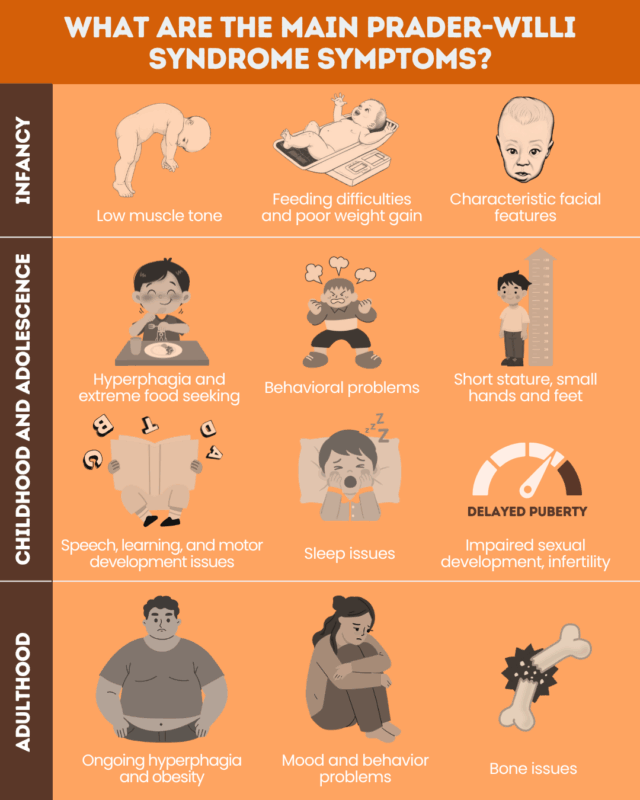Prader-Willi syndrome symptoms
Last updated Sept. 18, 2025, by Lindsey Shapiro, PhD

The wide range of possible Prader-Willi syndrome (PWS) symptoms include excessive hunger, low muscle tone, learning and behavioral issues, and distinct physical features.
Genetic defects affecting chromosome 15 are the underlying PWS causes. These defects lead to a loss of activity of genes involved in bodily processes that affect metabolism, appetite, growth, sleep, social behavior, and fertility.
The symptoms of PWS are often evident in infancy and change over time. These may vary in nature and severity from one person to another. Recognizing the clinical signs of PWS is typically the first step toward a PWS diagnosis and treatment.
Prader-Willi syndrome symptoms in infants
Babies with PWS typically exhibit very poor muscle tone, or hypotonia. This can manifest as:
- reduced fetal movements and abnormal position in the uterus
- “floppy” appearance when held
- rare, weak cry
- poor sucking reflex.
PWS symptoms in newborns may also include lower birth weight and an inability to breastfeed properly. Babies with PWS may need tube feeding to get adequate nutrition and gain enough weight, and may be slower to reach motor milestones like holding up their head and rolling over.
Early signs of PWS include distinct physical features that may become more apparent as a child grows, such as:
- almond-shaped eyes
- a narrow forehead
- a thin upper lip that’s turned down at the corners
- a narrow nose bridge
- a long, narrow head.
Other possible PWS symptoms in newborns include:
- undescended testicles in boys
- temperature regulation issues
- breathing problems
- eye muscle weakness, resulting in crossed eyes
- orthopedic issues like scoliosis, an abnormal spine curvature.

Prader-Willi syndrome symptoms in early childhood
With age, hypotonia tends to ease, while other PWS symptoms in infants may persist into early childhood. Although muscle strength improves, these children may still exhibit delayed motor skills, taking longer than their peers to crawl, walk, and potty-train.
Additional symptoms of the genetic disorder may become apparent from early childhood:
- a heightened interest in food and easy weight gain
- underdeveloped genitals
- sleep conditions and disorders, including sleep apnea (disrupted breathing while sleeping) and excessive daytime sleepiness
- language delays and speech problems
- cognitive issues and learning disabilities
- behavioral problems, such as stubbornness, temper tantrums, and obsessive-compulsive behaviors like skin picking
- decreased pain sensitivity
- thick saliva and tooth issues.
Increased food craving is the start of hyperphagia, a hallmark symptom marked by excessive and insatiable hunger. Children with PWS, most commonly from 8 years of age, struggle to control their food intake and may exhibit extreme food-seeking behaviors. Weight gain, which can lead to obesity, is likely if food intake is not strictly controlled as part of PWS treatment.
As children grow, additional physical features may also become more noticeable, such as:
- poor growth and short stature
- small hands and feet
- light-colored hair, skin, and eyes.
Children with PWS may also be at risk for central adrenal insufficiency, a potentially life-threatening condition marked by low levels of the cortisol hormone due to problems in certain brain regions. Symptoms can include fatigue, weakness, and slow recovery from illness.
Because PWS interferes with the production of sex hormones, it often delays puberty.
Prader-Willi syndrome symptoms in adults
In adulthood, most disease symptoms that emerged in childhood persist and many may worsen, including hyperphagia and behavioral problems. Additional PWS symptoms in adults may include:
- weak bones
- infertility
- lack of impulse control, not only related to food
- depression or other mood disorders.
Severe hyperphagia may give rise to morbid obesity and related health complications such as:
- type 2 diabetes
- heart disease
- high blood pressure
- breathing problems.
Prader-Willi Syndrome News is strictly a news and information website about the disease. It does not provide medical advice, diagnosis, or treatment. This content is not intended to be a substitute for professional medical advice, diagnosis, or treatment. Always seek the advice of your physician or other qualified health provider with any questions you may have regarding a medical condition. Never disregard professional medical advice or delay in seeking it because of something you have read on this website.
Recent Posts
- Starting growth hormone before age 2 does not harm PWS sleep
- I’m hopeful a new treatment will benefit my son with Prader-Willi syndrome
- Palatin to test 2 obesity-targeting drugs for PWS in clinical trials this year
- Still-recruiting ARD-101 trial for PWS lowers US enrollment age to 7
- For rare disease families, February is a month of both love and awareness
- Muscle, bone signaling imbalances found in non-obese PWS children
- Most PWS patients meet nutrient targets but struggle with calorie control
- Adults with PWS need lifelong support in daily activities, study finds
- Celebrating a milestone in life with Prader-Willi syndrome
- New technique ‘wakes up’ silent genes in Prader-Willi in lab testing